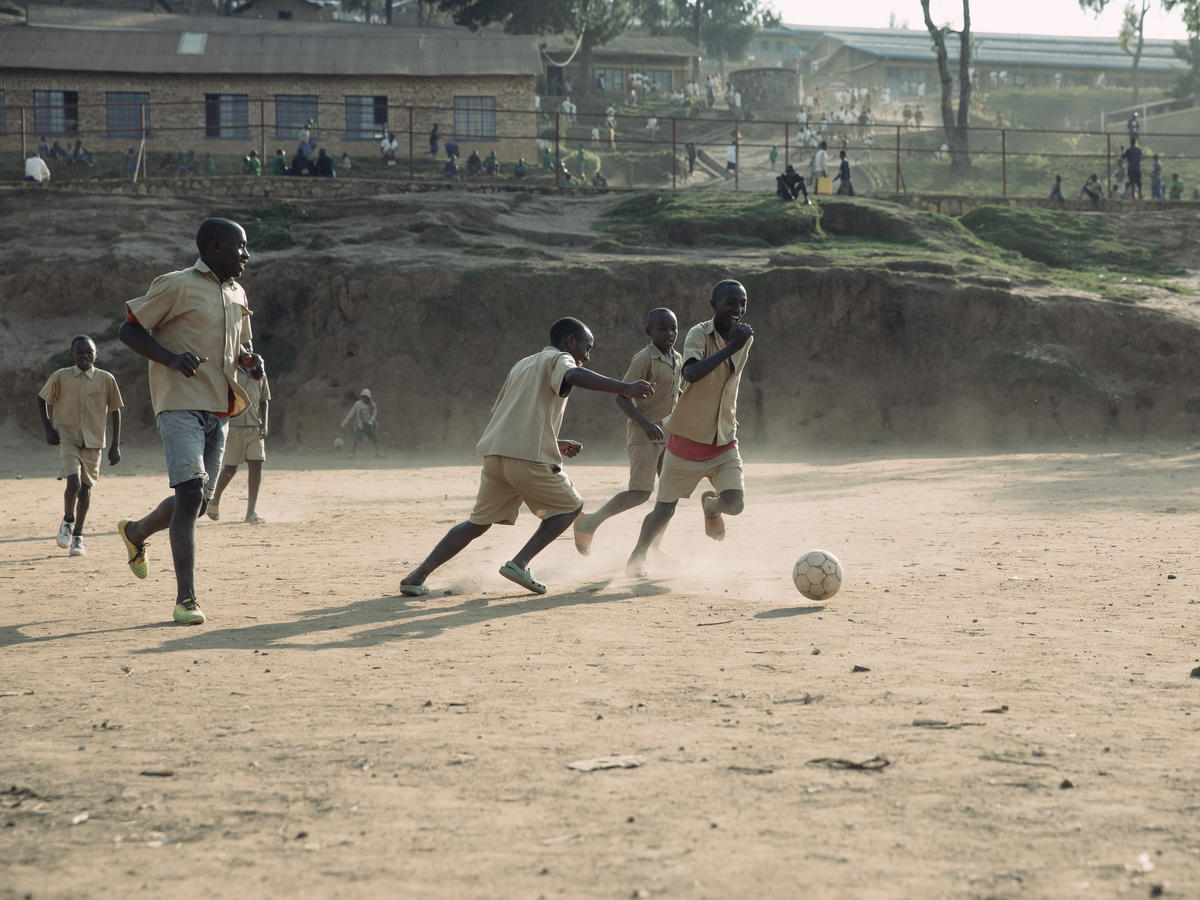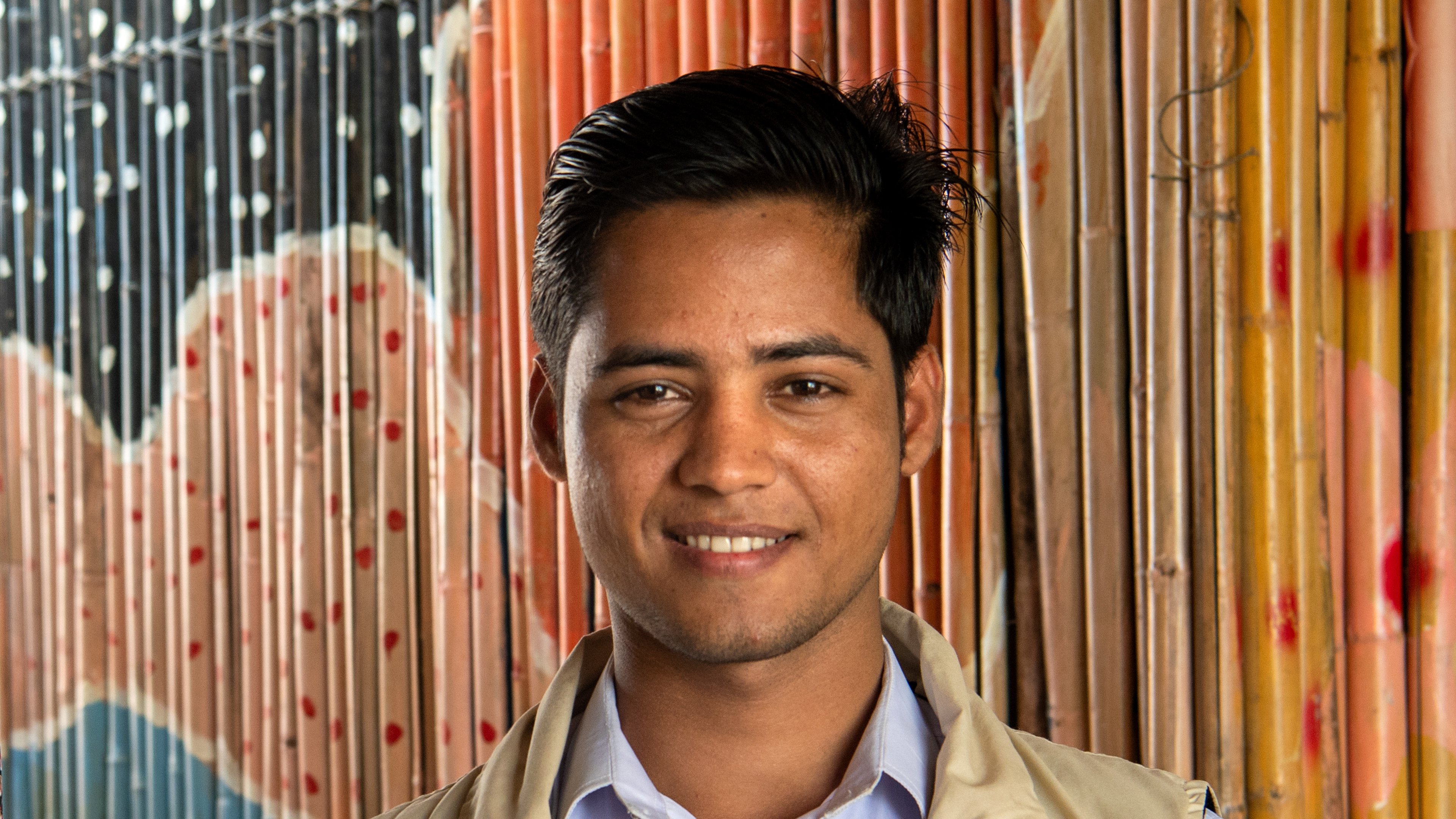New book captures the voices and art of African child refugees
New book captures the voices and art of African child refugees

JOHANNESBURG, South Africa, June 15 (UNHCR) - As the young refugee "Jenny" read out the traumatic experiences she had faced in her journey from tribal massacres in Burundi to a new life in South Africa, her voice grew increasingly strained, faltered and then halted.
For the audience assembled at the University of the Witwatersrand in Johannesburg, there could not have been a better demonstration of the emotional power conveyed by the personal stories appearing in a new book, The Suitcase Stories: refugee children reclaim their identities. The book, a by-product of an innovative programme providing art therapy to refugee children, contains both their stories and the drawings they made of their experiences.
"Then my parents died. They just burned the house of my family," reads the transcript of the story told by Jenny, who like all the participants chose the name used in the book. "All my family was living in that house - my mother, my daddy, my other aunty, my mother's sister, my brother, my sister. I don't know why, still now, why they burned the house. I wish to find out."
Just three years old at the time, she survived only because she was with another aunt during the attack. In the following years she faced life in exile in both the Democratic Republic of the Congo and Tanzania. One day when she was 11, she had the sudden realisation that she would never see her mother again.
"I asked God: 'Why did you take my mum away from me?' And it was like, what can I do next? Let me do some action here that I will never forget in my life," Jenny related. Taking her younger sister, she made her way south to a country about which she had only the vaguest knowledge.
Eventually arriving in South Africa - where they did not speak the language - the two girls lived on the streets of Johannesburg for weeks before they were taken in and given shelter. Now 20, she sells clothes in an informal market.
Jenny was just one of a group of children who Glynis Clacherty, a South African child researcher, saw needed psychological help. The aim - when she first thought of the project in 2001 - was not a book, but to let the children come to terms with their experiences by speaking about and drawing them.
Children were given old suitcases and told they could decorate the outsides with paintings about their lives. At the same time, Clacherty recorded long conversations with the children in which she let them tell of their experiences. Both the artwork and their words are in the book, which was unveiled six days before ceremonies for World Refugee Day are held globally on June 20.
"When I first met this group of young people, one of the young women said to me: 'I want you to help us with a book so people will know why we came here,'" Clacherty said. "And that is what we did. Each one of these children has a remarkable story to tell."
Proceeds from sales of the book will go to fund the continued operation of The Suitcase Project for more refugee children. In addition, T-shirts inspired by the art of the project were unveiled at the book launch. The profits from the clothing line, designed by Johannesburg-based Frances Andrew, will also go to the project.
"They are not just victims, they are survivors. They have overcome difficulties with remarkable courage," said Clacherty. "They are real human beings, they are not just refugees."
Clacherty started the project with art teacher Diane Welvering, subsequently gaining support from the UN refugee agency and other organisations. It also merged into UNHCR's study into violence affecting refugee children, which in turn provided insights that will be used in the UN Global Study on Violence Against Children due out later this year.
The children from The Suitcase Project were included in UNHCR workshops using artwork to draw out children's ideas and experiences on violence. Subsequently five were included in a regional UN meeting in which children not only discussed their experiences as a group, but proposed solutions to protect against further violence.
Many who were children when Clacherty launched her project are now young adults and the plan is to draw in a fresh group with the resources from the book and T-shirts. Many of those who took part joined Clacherty on the stage at the book-launch and their painted suitcases covered the tables.
"None of the children want to be labelled as refugees in their present lives, so they have chosen to remain anonymous," Clacherty wrote in an introduction to the book, "The names they chose to replace their own all have significance for them; they are names of lost parents or special friends from their home countries.

"As I have worked with these stories I have been struck by the sadness, the loss, the displacement that the children have experienced, but also overwhelmingly by their resilience, their ability to make a plan and often to see the funny side of what is happening to them."
Further information on The Suitcase Project, the book and the T-shirts is available at: www.suitcase.org.za
By Jack Redden in Johannesburg, South Africa








